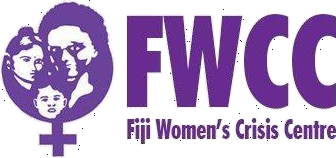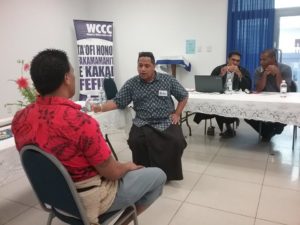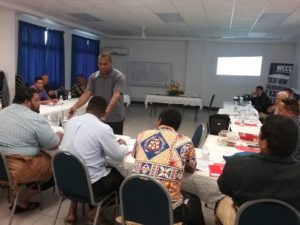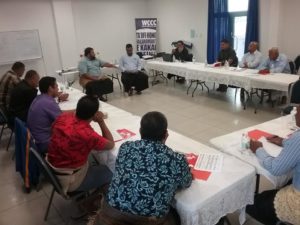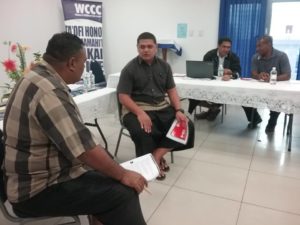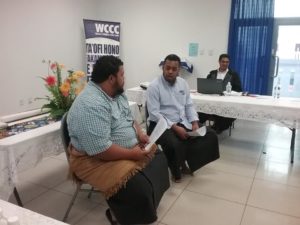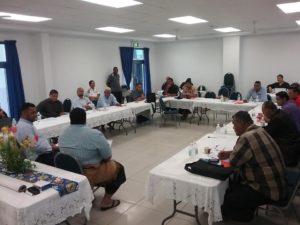PRESS RELEASE: WCCC – Male Advocacy Stage 2 on Ending Violence Against Women and Girls
23 Aug, 2017
[NUKU’ALOFA 22 August 2017] Being a Male Advocate on Ending All Forms of Violence Against Women and Girls, Gender Equality and Women’s Human Rights is not an easy role in fact you have to be prepared to feel uncomfortable because we will be taking a deep look at our male privileges, our power and how use that to control women,” said Lead Trainer, Melkie Anton, to the group of men participating in the second stage of the Male Advocacy Training in Nuku’alofa. From the first Male Advocacy training held in Tonga in 2007 with approximately 40 men, a total of 8 men showed interest to continue and successfully completed all three stages in Fiji. With the second recruitment and all the 3 stages now taking place in Tonga this year, a total of 35 men commenced in May and 20 have shown commitment to continue with stage two.
The second day of the training focused on how culture and religion has been wrongly used to justify gender inequality. The male participants were challenged to re-look at cultural practices that places women in an inferior position to men. One of the topics the men found interesting to unpack was the practice of the ‘Api – a cultural ritual performed during the wedding ceremonies where the bride’s virginity is tested and a blood stain sheet is produced as evidence. The discussion was put on hold while a quick basic 101 on the women’s reproductive system to debunk the myths around the ‘breaking of a women’s virginity’ was undertaken with the men. There was a sense of surprise in the room when the men’s perception of virginity resulted in a various myths and misconceptions, for example the view that every woman bleeds during the first experience of intercourse, “in fact fewer than half of all woman bleed during the first time they have sex, which means a lot of women don’t bleed at all,” said ‘Ofa Guttenbeil-Likiliki, WCCC Director to the group of men.
According to one male participant, “Why do we test women’s virginity (‘Api) before marriage and we don’t care about the man’s sexual history, he could have several sexual relationships and children before marriage but no one cares about that – all we care about is testing the woman’s virginity to the point that where a man knows that his wife was not a virgin when they married he will use that against her until she dies and is buried – he will remind her of that every time they have a dispute – our expectations and testing of a woman’s virginity and not having any expectations on the man is unfair on the woman – is this aspect of culture still required?”
The discussions continued in the same spirit when it came to religion,”….many men wrongly use the bible for their own personal advantage and where they can benefit from it to keep power and control over their wives….we need to read our bible more and study the texts to be able to challenge these limited types of interpretations because the texts often used to place women in a lesser position is not studied or looked at in its entirety and because many people don’t read the bible they then accept what they are taught and never question it…..” another participant agreed and said that as Christians we need to really ask ourselves what are our core principles, “….are we followers of Christ? Or are we followers of men? … If we are real followers of Christ, i.e. Christians – then why is there so much violence against women and children in Tonga? Simple, because we
are followers of men and men’s power and control – why are we still holding on it it? Who is benefiting from men’s power and control?”
Anton then took the men through some practical sessions on how to respond to the justifications given against the achievement of gender equality, women’s human rights and the fight to end all forms of violence against women and girls, “you have some scenarios in front of you and you have to now put into practice what you have taken on board and test your ability to respond effectively to statements made by people who are closet to you, people whom you work with, go to church with and anyone you come across that will challenge the idea of gender equality and what you have learned here – sometimes that can really make you feel uncomfortable and that’s a good thing, it means your committed,” said Anton.
Melkie Anton is from Papua New Guinea and was part of the inaugural group of Pacific men who worked closely together with the Fiji Women’s Crisis Centre and the Pacific Women’s Network Against Violence Against Women (PWNAVAW) to develop the home grown Male Advocacy initiative over a period of 4-5 years. Part of the inaugural group of Pacific Male Advocates are six men from Tonga who will also be assisting with the second stage training.
The second stage is financially supported by Australian Aid (DFAT), UNWomen Pacific Regional Ending Violence Against Women Facility Fund and the Pacific Women’s Network Against Violence Against Women (PWNAVAW) [ENDS]
